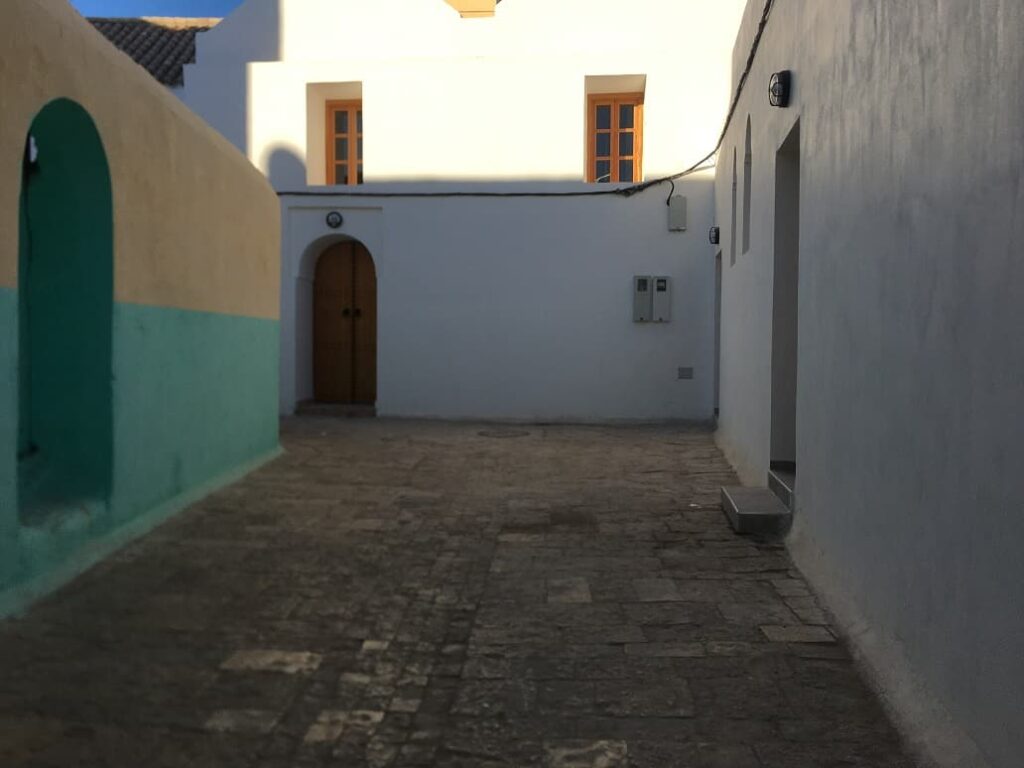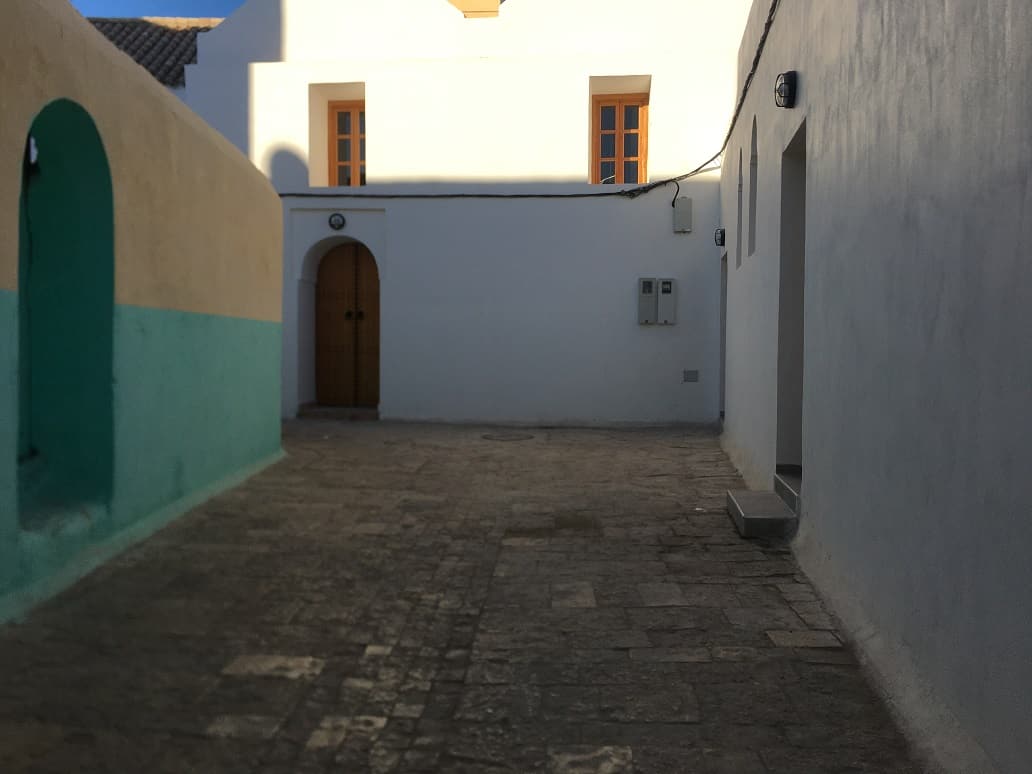The personality of Abu Ubaida Mohammed al-Qasim al-Sharqi al-Omari, known as Sidi Bouabid al-Sharqi, is considered prominent and highly respected in the city of Boujad and throughout Morocco. His name is accompanied by widespread fame and profound respect. Stories suggest that he possessed extraordinary powers, including the ability to heal people from illnesses.

Basic Information Table
 |
|
| Born | 926 AH – 928 AH, Ghar El Douh, Tadla, Morocco |
|---|---|
| Death | 1010 AH at the age of 84 years, Boujad , Morocco |
| Resting place | Zaouia Cherkaouia, Boujad |
| Nationality | Moroccan |
| family | Al-Omari |
| Religion | Islam |
| Belief | Ahl al-Sunnah wa al-Jama’ah |
| School of Jurisprudence | Maliki |
| Known for | Founder of the Sharqawiyya Sufi Order and builder of Zaouia Cherkaouia |
Table of Contents
Personal Life:
Sidi Bouabid al-Sharqi was born in the year 926 AH (Arabic calendar) or 928 AH in a location approximately 3 kilometers from Kasbah Tadla near the Oum Er-Rbia River. He passed away in the city of Boujad in the year 1010 AH. Sheikh Sidi Bouabid al-Sharqi is considered the founder of the Sharqawiya Sufi order in Morocco. It is claimed that his lineage can be traced back to Umar ibn al-Khattab, who is also a prominent figure in Arab history.
He had 11 children, including Sheikh Sidi Abu al-Nasr Abdelkader, Sheikh Sidi al-Ghazwani Bushaqur, Sheikh Sidi Abdel Salam, Sheikh Sidi al-Hajj al-Meknassi, Sheikh Sidi Al-Morsli, Sheikh Sidi al-Harithi, Sheikh Sidi al-Maliki, Sheikh Sidi al-Daqqaq, Sheikh Sidi al-Tanji, Sheikh Sidi al-Tunsi, and Lady Lalla Mira.
His siblings included Sidi Abdel Nabi, Sidi Abdel Aziz, Sidi Saeed, Sidi al-Samouni, and Sidi Abdel Rahman.[2]
Education and Journey:
Since his early childhood, Bouabid El-Sharqi distinguished himself with a profound love for reading, showcasing remarkable intelligence from a young age. His personality took shape during an exceptional learning journey, as he memorized the Quran (the holy book of Muslims) and studied religious sciences and literature under the supervision of his father, who played a key role in building this distinctive character. His father sent him to the city of Marrakech to apprentice under some of its prominent scholars, such as Sidi Abdullah ben Sassi al-Sba’i, a disciple of Abdullah al-Ghazwani Maula Lqasr, and Sidi Omar al-Qastali.
Sidi Boubid El-Sharqi’s father, Sidi Belqasim al-Za’ari, passed away on the banks of the Oum Er-Rbia River, near kasbah tadla.
During the period he spent in the city of Marrakech, people loved him and he became known for his kindness, knowledge, intelligence, and generosity. He then returned to his hometown and later moved to the Mediterranean Atlas in a place now called Gharb Al Alam. He stayed there for a short period and then moved to a location about 23 km away from kasbah Tadla. He set up his tent there, dug a well, built a mosque, and the area was surrounded by forests and many trees.
The region was inhabited by wolves known as Abu Jaada, so the place was named Abu Aljaad, also known as (Boujad, Bejaad, Abu al-jad), from that time onwards. The place where Sidi Bouabid Al-Sharqi settled is now known as Al-Abar, near Rijal Al-Miaad, and the well he dug is called today Bi’ar Al-Jamiaa.
Sidi Bouabid Al-Sharqi stayed in this place for a short period and then moved to a location known as Rabiaa, which is now called Rahbat Azraaa. He built a school for learning in Al-Mrah Al-Kabir, known today as derb al-qadireen. Students came to the school from all directions, and the city of Boujad became renowned for knowledge, religion, and trade.
In the year 1010 AH, Sidi Bouabid El-Sharqi passed away at the age of approximately 84 years in the city of Boujad. He left behind numerous students who spread his teachings throughout Morocco.
The Sharqiya Sufi order played a significant role in disseminating knowledge, producing prominent scholars. Notable figures who graduated from this order include Sidi Al-Arbi ibn Al-Sayeh, the renowned scholar buried in Rabat Al-Fath, Sheikh Sidi Mohamed Al-Saleh ibn Mohamed Al-Maati, buried in Boujad (died in 1727 AD), and Sheikh Sidi Mohamed Al-Maati ibn Mohamed Al-Saleh, the author of Dhakhira al-Muhtaj (died in 1766 AD). Additionally, there is Abu Ali Al-Rahali, who also emerged from this tradition.[2]
Rumors and Miracles:
We asked people living in the city of Boujad about the rumors surrounding the figure of Sidi Bouabid Al-Sharqi, and this is what they told us:
- Healing the Afflicted: It is said that he had a supernatural ability to heal the sick from all diseases.
- Expelling Demons: There are rumors that he expelled demons from a group of individuals.
- The Miracle of the Staff: It is said that he had a staff, and when he struck the ground with it, water would spring forth from the earth.
- Assistance in Finding Work: Rumors suggest that anyone without employment, when they go to the tomb of Sidi Bouabid Al-Sharqi, kiss his grave, and ask him for work for themselves or their children, their request is answered.
Note: These miracles are only rumors or hearsay from people and may be true or false.[1]
Achievements of Bouabid Al-Sharqi:
Establishment of the Sharqiyya Sufi Order:
Bouabid Al-Sharqi founded the Sharqiyya Sufi Order, a Sufi movement characterized by tolerance and moderation, with the aim of reforming society and promoting the values of love and peace.
Dissemination of Sufi Teachings in Morocco:
Bouabid Al-Sharqi made significant efforts to spread his Sufi teachings in Morocco, influencing many individuals with his philosophy and guidance.
Construction of Zaouia Cherkaouia:
Bouabid Al-Sharqi built the Zaouia Cherkaouia, a Sufi center located in the city of Boujad, serving as a focal point for the dissemination and promotion of the teachings of the Sharqiyya Sufi Order.
Construction of Schools, Mosques, and Well Digging:
In addition to his contributions to the Sufi field, Bouabid Al-Sharqi was involved in building numerous schools and mosques, effectively contributing to the provision of educational and religious centers for the community. He also played a role in digging wells to provide access to clean water.[2]
Geographic Location of the Shrine of Sidi Bouabid al-Sharqi:
- Country: Morocco
- Region: Khouribga
- City: Boujad (also known as Bejaad in French, Abu al-Jad in Arabic).
- Google Maps: QJ94+PMF, Boujad.
- The shrine of Sidi Bouabid Al-Sharqi is located near Derb Al-Ghazaouna, close to Naqachat and Jarda Tehtaniya.
- Bouabid Al-Sharqi, also known by various formulations in different languages such as Bouabid Al-Sharqi or Bouabid Al-Sharky (English), Bouabid Cherki (French), and Bouabid Acharki (Arabic).[1]
Hobbies and interests:
Sidi Bouabid Al-Sharqi was a person characterized by distinctive interests and hobbies. He had a deep love for nature, as evidenced by his choice of residence, which featured abundant trees, forests, rivers, and breathtaking natural landscapes.
He was also an avid traveler, as reflected in his journey through various places and cities, demonstrating his passion for exploration and experiencing new locations.
With a significant interest in religion, he pursued the study of religious sciences and memorized the Quran, reflecting his dedication to practicing his faith.
His love extended beyond nature and travel; it encompassed a commitment to charitable work. He built several schools and mosques, and dug wells, demonstrating his dedication to serving the community and improving the living conditions of others.
In this way, the hobbies and interests of Sidi Bouabid Al-Sharqi indicated a balanced and inspirational personality that enabled him to achieve numerous accomplishments and leave his mark in various fields.[2]
Death and Legacy of Sidi Bouabid Al-Sharqi :
After a life filled with achievements and dedication, Sidi Bouabid Al-Sharqi passed away in the year 1010 AH (Arabic calendar) at the age of 84, in the city of Boujad. His departure left a significant void in the Sufi and religious community.
Although his physical presence has left this world, his legacy lives on through the disciples who received his teachings. He left behind a generation of students and believers who transmitted his philosophy and guidance throughout Morocco.
The impact of Bouabid Al-Sharqi is not limited to the realm of Sufism and religion; it extended to the construction of schools and mosques, contributing to the improvement of education and the provision of worship centers. He succeeded in promoting values of tolerance and moderation, which were central to his Eastern approach.
Despite his departure, Bouabid Al-Sharqi remains present in the hearts of his followers and admirers. His legacy continues to shape and guide the path of the Eastern Sufi tradition and his contributions to solidifying religious and educational values in Morocco persist.[2]
References:
- Information obtained from the residents of the city of Boujad
- Habous.gov.ma